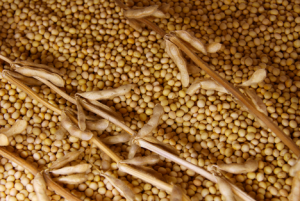Soy. A Healthy Choice or Not?
Despite being touted as healthy, soy is responsible for a number of health problems. Most modern soy foods are not fermented to neutralize toxins in soybeans, and are processed in a way that alters the proteins and increases levels of carcinogens, an agent directly involved in causing cancer.
Safe Soy
Raw natural soybeans contain a toxin that is harmful to our bodies. The Chinese figured this out thousands of years ago and discovered that fermenting the soybeans neutralizes the toxin. Because the long fermentation process neutralizes the natural toxins found in soy, some soy is okay to eat. Fermented soy products like miso, nato, fermented tofu, soymilk from fermented soybeans, soy or tamari or shoyu sauce, and tempeh, are not harmful and can be eaten in moderation.
Unhealthy Soy Choices
Although there are so many dangers and unhealthy soy choices that whole books have been written on the subject, today I’d like to just touch on the surface of the dangers of soybean oil. Soybean oil is pretty much inescapable these days, but it is so important to avoid it like the plague.
Restaurants and so many foods in the supermarkets use soybean oil in their products which is why you have to be careful when dining out and/or eating processed foods. It is one reason why I stay away from fried foods when dining out, or read EVERY ingredient list of anything that I buy that comes in a package. If it says soybean oil (AKA vegetable oil) I put it right back on the shelf.
Soybeans & Processing for Soybean Oil
Most of the soybeans in America are treated with acid baths, high heat, and additives such as nitrates (which can convert to carcinogens in the body) before they are made into soy products. Remember carcinogens have been linked to causing cancer in the body.
To produce soybean oil, hexane or other solvents are first applied to help separate the oil from the soybeans, leaving trace amounts of these toxins in the commercial product. Hexane is a harsh solvent (and a known carcinogen) used in many industrial practices, including dry cleaning, and cannot be the least bit beneficial in any diet. Nearly all soybean products contain trace amounts of these carcinogenic solvents. It’s no wonder American’s cancer victims are on the rise.
You may of heard that soybeans contain large amounts of fragile omega-3 fatty acids, however they are particularly susceptible to rancidity when subjected to high pressures and temperatures. Unfortunately, high pressure and temperature are required to remove soybean oil from the soybeans, and the omega-3’s are chemically converted into free radicals.
Soybeans & GMO (Genetically Modified Organisms)
 Unless organically grown, all soybeans grown in the U.S. are from genetically modified seeds–meaning that pesticides are genetically engineered into the DNA of the seeds so that when insects eat the crops, they die. Most of the soybeans grown in this country are for producing soybean oil (AKA vegetable oil!!). Research shows that the hydrogenation of these oils turns them into trans-fatty acids. These oils are very toxic to our bodies and have been linked to cancer, diabetes and cardiovascular disease.
Unless organically grown, all soybeans grown in the U.S. are from genetically modified seeds–meaning that pesticides are genetically engineered into the DNA of the seeds so that when insects eat the crops, they die. Most of the soybeans grown in this country are for producing soybean oil (AKA vegetable oil!!). Research shows that the hydrogenation of these oils turns them into trans-fatty acids. These oils are very toxic to our bodies and have been linked to cancer, diabetes and cardiovascular disease.
Negative Effects of Soybean Oil
Soybean oil also contains a toxic biochemical called phyto-hema-glutinin or PHG for short. PHG kills rats and is poisonous to all living things. PHG is a large protein molecule that has proven to be specific in its ability to agglutinate human blood. Agglutination essentially means to “glue” or to cause to “adhere,” to form a “mass.” Because of this, PHG slows blood circulation and forms blood clots. It also combines with impurities in the blood and forms plaque on the walls of the arteries.
PHG also:
Negatively affects the central system
Negatively affects the peripheral nervous system
Alters hormone activity
Slows down vital organ function
Interferes with digestion
Can cause memory loss
Negatively affects thyroid function
Although I focused on the dangers of soybean oil in this post, if you are interested reading more about soy I suggest reading: “The Whole Soy Story” by Kaayla T. Daniel, PhD, CCN.


